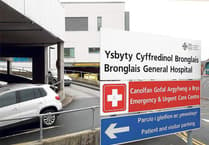“People are pulling their own teeth out and using superglue to mend them – that's how dreadful it is” says long-time Powys councillor Joy Jones, calling dentistry in the area “a joke”.
“We’re living in a society where we can’t get the help we need”.
Almost anyone whose tried to see a dentist recently will know that NHS dentists are becoming an endangered species.
Will new plans to make a new dental school between Aberystwyth and Bangor University’s address the issue?
With waiting lists to be registered as an NHS patient sometimes years long, many who can afford it have given up and paid to see private dentists.
Those who can’t do that drive long distances seeking cheaper treatment in south Wales, the Midlands or abroad in Hungary or Turkey.
Izzy Kathryn, a 23-year-old graduate from Aberystwyth was sent to Cardigan (an 80-mile round trip) for an emergency appointment after a wisdom tooth eruption caused her “terrible pain” when the tooth began cutting into her cheek, making it difficult for her to eat and speak.

She said: “Luckily, I can drive and I got myself down there but if I didn’t have access to a car then it would have been a lot more difficult.
“The NHS didn’t help much either, I’m now on a waiting list for a surgical extraction but I've been waiting six months.
“I’ve never met anyone that’s been able to find an NHS dentist in or around Aberystwyth.”
Many in the industry describe NHS dentistry as an ‘emergency-only service’ now – unable to get regular check-ups or appointments for small interventions; patients aren’t seeing dentists until it’s a medical emergency.
By calling NHS 111 they’ll get an emergency appointment, except the treatment they receive has to be done on the spot.
If the treatment takes longer than one appointment like with root canals, the follow up will be offered outside of the emergency clinic, meaning that patients are now opting for their teeth to be pulled rather than a longer treatment that could save the tooth, due to the uncertainty of those extra appointments.
This is more serious than a gappy smile - dental health and the number of teeth a person has are strong indicators of how long a person will live.
A 2015 study found those with 20 teeth or more at the age of 70 had a considerably higher chance of living longer than those with less than 20 teeth.

Those that can’t afford private care are slipping down a precarious slope of health inequality with potentially life-limiting consequences.
This can be seen in Dee Thomas who lost two stone after waiting a year to fix five broken teeth.
Her issues began because she hadn’t had regular checkups, so no one spotted that her old fillings had weakened her teeth, causing cracks.
The 62-year-old from Llanidloes waited eight months for the first appointment to remove two teeth - the second appointment was then cancelled twice.
A year of her life was spent eating soup and mashed vegetables: “Even the dentist said they should be charging for the weight loss programme - I lived on painkillers in all honesty.”
Unable to find a dentist closer to her, she’s registered with one in Treorchy – a four-hour round trip.
This month, Aberystwyth and Bangor University’s announced they’d teamed up to create plans for a new dental school, focusing on the needs of primary and community dental care across rural and semi-rural Wales.
The school would benefit from Bangor’s portfolio of health and dental programmes and Aberystwyth’s expertise in nursing education and rural healthcare.
The idea is that more newly qualified dentists coming out of mid Wales will mean more dentists staying in the area – as Ceredigion Preseli MP Ben Lake testifies, “evidence shows a strong link between the place where students train and the place they choose to practice”.
A Bronglais Hospital staff member who did not want to be named heralded the school as “really, really significant”.
She said that being unable to train in medicine, midwifery or dentistry locally has led to “huge problems recruiting NHS staff in the area” - pointing to the recent Bronglais children ward downgrade that was caused by a recruitment crisis: “It’s not possible to train as a paediatric nurse locally”.
This summer, the first nurses from Aberystwyth University’s 2022-launched nursing programme graduated, with over half going into Bronglais and Glangwili Hospital’s, or district or practice nursing within Hywel Dda University Health Board.
The rest took up posts elsewhere in Wales.
Mabon ap Gwynfor, MS for Dwyfor Meirionnydd, said the school would “lay the foundations for a sustainable, locally rooted dental workforce” that was “deeply connected to the communities they serve”.
However a shiny new dentist school isn’t happening anytime soon – the Welsh government would need to foot most of the bill to create it, and dentistry degrees take five years plus two years in-the-field training – so we’re looking at the 2030s before fledgling dentists disperse to practices across the Cambrian and Eryri hills.
But is the problem with finding a dentist because there aren’t any, or just that there aren’t any that will treat NHS patients?
In 2023-24 there were 415 NHS dental practices in Wales, mostly clustered to south Wales.
In that year, 1,398 dentists treated NHS patients in Wales – a 2.6 per cent decrease from the previous year, and a 2.8 per cent decrease from 10 years ago.
The annual number of NHS treatments has grown steadily since the pandemic – a 5.8 per cent increase on the previous year, but 39.4 per cent lower than the number of NHS treatments done 10 years ago.
One dentist described feeling “strangled” by NHS contracts, unable to care for them properly due to quotas and targets that, if not met, mean the dentist must pay back money to the tune of tens of thousands of pounds.
Dental practices are privately owned rather than funded by the NHS, with most relying on private work to sustain the practice as a business.
The current NHS contracts pay dentists per patient, regardless of how much treatment each patient requires, with many making a loss on their NHS work.
It's no wonder dentists report considering dropping NHS contracts if both ethically and financially, they make no sense.
But things are changing.
The recently launched Dental Access Portal has made it easier to find NHS dentists – instead of ringing up every dentist in your area to see if they’re taking NHS patients, the Portal launched this February puts you on a centralised wait list and notifies you when a local space opens up – Sonia Richardson from Pwllheli described it as “brilliant”, getting a dentist after a three month wait, having waited six years.
In September, Pembrokeshire Senedd Members Paul Davies and Samuel Kurtz welcomed the Welsh Government’s decision to abandon proposals that would have seen patients assigned a different dentist for each check-up, rather than remaining with their family dental practice.
A public consultation attracting over 6,000 responses showed that 77.2 per cent of respondents disagreed that the Welsh Government’s changes would help ensure fair access to NHS dental care.
Mr Davies said, “I’m pleased that the Welsh Government has rowed back on its plans to allocate patients to any practice, as continuity of care is crucial and needs to be protected.”
He added: “The system is at breaking point – we know that in Pembrokeshire, many patients can’t access services and dentists are frustrated, overwhelmed and at risk of burn out.”
“The current proposals would also result in gaps of up to two years between check-ups for some patients, which is not acceptable.”
Mr Kurtz said, “Patients deserve reliable, continuous care, not years between check-ups or a system that leaves them waiting in frustration.
“While it’s right that the Welsh Government has stepped back from automatic patient allocation, the service remains under severe pressure, with many unable to access treatment and dentists close to burnout.
“Ministers must now go further, rethink their proposals, and work constructively with the profession to tackle the wider crisis in NHS dentistry.”
We contacted Henry Tufnell MP recently, who back in June had shared shocking findings from a dentistry survey which showed that:
• 88 per cent of respondents did not currently have an NHS dentist.
• 60 per cent had attempted to register but were told no places were available.
• Over one-third of people reported not seeing any dentist at all.
• NHS care is often limited to emergency-only services, with many patients receiving only temporary relief.
• Travel barriers, long delays, and high costs are significant deterrents - especially for children, the elderly, and low-income households.
Mr Tufnell had said: The response to my dentistry survey points clearly in one direction: patients are frustrated with the service they’re receiving from Hywel Dda University Health Board.
“As their MP, it’s my duty to hold HDUHB to account and continue pushing for real improvements in the delivery of health services.”
• One resident reported waiting 16 years for an NHS dentist.
A parent paid £2,000 out of pocket for their 19-year-old son's dental care.
Another individual developed jaw cancer, citing delays in treatment as a contributing factor.
“Patients are suffering, and services are falling short,” said Mr Tufnell. “[Their] voices strengthen the case for urgent change.”
Responding to our questions, the Labour Member of Parliament for Mid and South Pembrokeshire added:
“There are no further updates on this at the moment, but we should have some in December. I stand by what I said in June following the survey results. Lack of access to dental care is a serious problem in Pembrokeshire, and my constituents are being let down by the current system.”
This year, Welsh government also began the biggest consultation in the history of its devolution on “the biggest changes NHS dentistry in Wales has ever seen” - overhauling NHS dental contracts with a focus on prevention.
Health Secretary Jeremy Miles said: “Every person in Wales deserves quality dental care when they need it, regardless of where they live or their background.
“Change is needed, and our new dental contract is key in delivering what people want – a system which is fair and effective.”
The new contract coming into effect in April 2026 will increase the general fees dentists are paid to see NHS patients from £135 to £150 per hour.
Dentists will receive a fixed amount to support ongoing care for healthy patients rather than payments per visit and rewards for delivering care packages for patients with complex needs.
Following the consultation, plans to allocate patients to a dentist per check-up have been ditched – patients will stay with a single practice.
It will reduce the requirement for dentists to recall healthy patients every six months to 24 months – the minimum required by NICE.
Dentists have raised concerns that longer recall times could reduce their ability to spot early signs of disease and contribute to a ‘social divide’.
Patient charges will be simplified – requiring those receiving NHS treatment to pay 50 per cent, capped at £384 regardless of how much treatment they need.
Dentists have argued that this will make NHS costs more similar to private dental care, making private packages more appealing to patients who may be seen more regularly on a private contract.
The British Dental Association wrote that despite the increased payments the changes “fails to reflect the true cost of care, and risks leaving NHS providers stuck delivering care at a loss or walking away from the service”.
Russell Gidney, Chair of our Welsh General Dental Practice Committee, said that there are “important wins” in the changes but that “plastering over a few of the biggest cracks is just superficial repairs”, criticising Welsh governments ‘take it or leave it’ approach to the new contract and calling the government to continue amendments to the plans “to ensure real threats to the service don’t make the final cut”.
.jpeg?width=752&height=500&crop=752:500)




Comments
This article has no comments yet. Be the first to leave a comment.